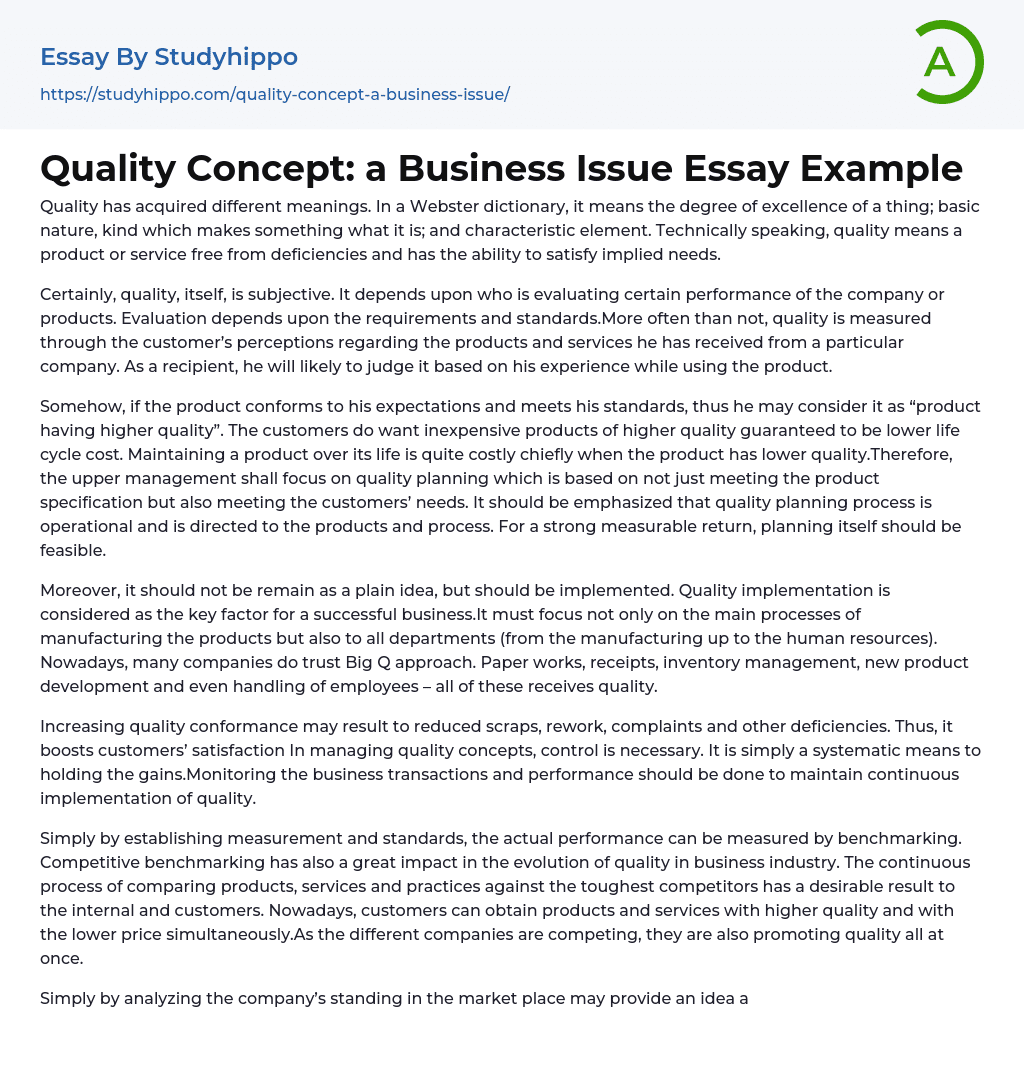The term quality has various interpretations. Webster dictionary defines it as the level of superiority of an object, its fundamental essence or type that determines its identity, and a distinctive attribute. In technical terms, quality pertains to a flawless product or service that fulfills implied requirements.
Quality is a subjective concept that lacks a clear definition and varies based on the evaluator's requirements and standards. Customers' perceptions of products and services they receive from a company are typically used to measure quality, with their interpretation being based on firsthand experiences.
Customers are searching for products that meet their expectations and standards, as they believe them to be of superior quality. They want cost-effective items that ensure lower life cycle expenses since maintaining low-quality products is expensive in the long run. To satisfy customers' requirements and produce significant measurable profits, upper management should concentrate on quality planni
...ng that covers both product specifications and customer expectations. It's crucial to remember that quality planning is an operational process aimed at products and processes while ensuring feasibility.
Implementing a plain idea is crucial for successful business. Quality implementation, which encompasses all departments from manufacturing to human resources, is the key factor. Nowadays, many companies trust the Big Q approach and aim for quality in all operations including paper works, receipts, inventory management, new product development, and employee handling.
Improving quality conformity can lead to a decrease in scraps, rework, complaints, and other shortcomings, ultimately improving customer satisfaction. Adhering to quality management principles requires maintaining control and systematically building on progress. To ensure the continuous implementation of quality, it is important to monitor business transactions and performance.
Establishing standards and measurement allows for benchmarking
to measure actual performance. Competitive benchmarking drives quality evolution in the business industry. Continuously comparing products, services, and practices against tough competitors has desirable results for both internal stakeholders and customers. Today, customers can obtain higher quality products and services for lower prices as companies compete and promote quality simultaneously.
By analyzing a company's position in the market place, it may provide insight into their performance in delivering products and services. A broad range of customers can be seen as a proof of competitiveness. The implementation of quality measures correlates with higher market position, as quality is linked to productivity, cost, cycle time and value. Higher quality can lead to greater productivity by reducing errors, defects and scraps, resulting in more sellable products.
Efficient resource utilization is ensured with no wastage of raw materials, labor or capital. The input resources remain constant but the output obtained is maximized. Cost is not necessarily proportional to quality, as conforming to quality standards can reduce the price by minimizing rework, complaints, scrap and other defects. This enables an increase in product features without a hike in selling price, leading to customer satisfaction and higher income. Additionally, higher quality levels lead to reduced response time.
Customers often note service time as a factor of quality and satisfaction. Implementing quality control eliminates repetitive tasks and results in faster response times, leading to greater customer satisfaction. Ultimately, higher quality translates into increased value.
Every company needs to prioritize quality to succeed in the competitive world markets. It is crucial that the price reflects the quality and meets the needs of the customers. Quality is a business matter that demands prompt attention.
- Accounting essays
- Marketing essays
- Automation essays
- Business Cycle essays
- Business Model essays
- Business Operations essays
- Business Software essays
- Corporate Social Responsibility essays
- Infrastructure essays
- Logistics essays
- Manufacturing essays
- Multinational Corporation essays
- Richard Branson essays
- Small Business essays
- Cooperative essays
- Family Business essays
- Human Resource Management essays
- Sales essays
- Market essays
- Online Shopping essays
- Selling essays
- Strategy essays
- Management essays
- Franchising essays
- Quality Assurance essays
- Business Intelligence essays
- Corporation essays
- Stock essays
- Shopping Mall essays
- Harvard Business School essays
- Harvard university essays
- Trade Union essays
- Cooperation essays
- News Media essays
- Waste essays
- Andrew Carnegie essays
- Inventory essays
- Customer Relationship Management essays
- Structure essays
- Starting a Business essays
- Accounts Receivable essays
- Auditor's Report essays
- Balance Sheet essays
- Costs essays
- Financial Audit essays
- International Financial Reporting Standards essays
- Tax essays
- Accountability essays
- Cash essays
- Principal essays




